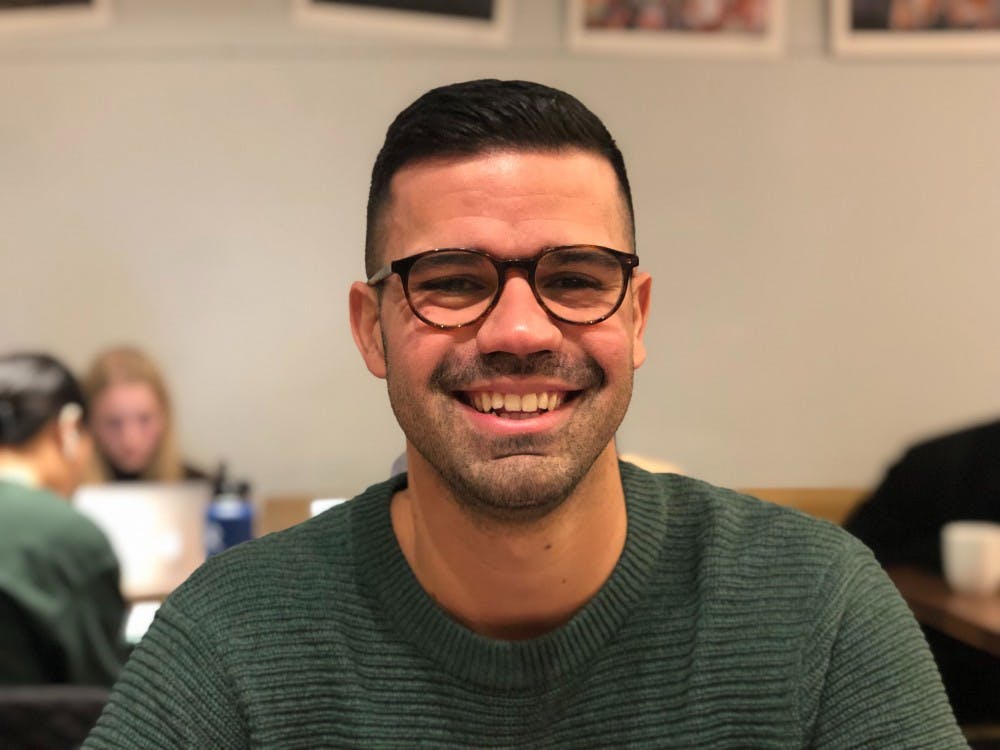
Adrian Rivera-Reyes, democratic socialist and current Penn grad student, could be elected as the first openly gay and only millennial serving in Philadelphia’s At-Large City Council.
Credit: Katharine ShaoThe day after Adrian Rivera-Reyes attends his graduation ceremony from the Perelman School of Medicine and walks across the stage with a Ph.D. in cell and molecular biology in May, he could be elected as the first openly gay person and only millennial serving in Philadelphia’s City Council.
Rivera-Reyes, a democratic socialist, is currently campaigning for an at-large seat in the Democratic primary, all while balancing cancer biology research at Penn. He defended his Ph.D. dissertation in December 2018 and is now pursuing postdoctoral experiments. The primary election will be held May 21.
"I saw that our local government wasn't doing their job, [they weren’t] implementing changes that I wanted to see,” Rivera-Reyes said on his switch from cancer biology to politics. “So I said ‘I'll grab a clipboard and get the signatures [for my candidate nomination petition].'"
Rivera-Reyes’ campaign, which was announced last November, focuses on providing more opportunities for working class people, people of color, and LGBTQ+ communities. His campaign is also focused on increasing funding for Philadelphia public schools and investing in solutions to the opioid epidemic.
"[These are issues that] have to be dealt with now, with the urgency of today," Rivera-Reyes added. "Especially because this is affecting our people, our family, our neighborhood,” he said. “I've had family members die because of the opioid epidemic. So all of these issues are also personal."
Rivera-Reyes was born in Puerto Rico to a struggling working-class family. At one point, he said his family was forced to sell their house and move constantly to find affordable housing. He added that despite the hardships he faced, he is grateful for the educational opportunities he received, allowing him to continue following his passion in cancer biology and study at Penn.
Philadelphia’s City Council, Rivera-Reyes said, is mostly composed of politicians, lawyers, and others who are not representative of the average individual, which is something he hopes to change if elected.
The Penn researcher added that although he is not a typical candidate, he is not deterred. He said his experience is what makes him stand out from other candidates and could help bring “moral clarity” to the City Council.
"Perspective is key. Experience without perspective won't get you too far along [in politics].” Rivera-Reyes said. “It's really important that we bring perspective in decision making. We need the perspective of Hispanic Latino person, a gay man, a perspective of a scientist."
“It's impossible to be [a good] leader if you don't listen to the people and their struggles,” he added.
Despite his untraditional background as a biologist-turned-politician, Rivera-Reyes has been involved with politics for several years. His history of student activism includes three years serving as president of the Penn Science Policy and Diplomacy Group, a graduate student group that advocates for “science-informed policymaking,” and as an organizer for Graduate Employees Together – University of Pennsylvania, Penn’s graduate student union. He has also served as a policy analyst for Molly Sheehan, a former U.S. Congressional Candidate and 2014 Penn Medicine graduate.
In 2017, Rivera-Reyes, along with three other Penn students, helped plan the March for Science in Philadelphia.
“I genuinely feel that kindness and hard work are his mantras,” said Karin Eisinger, an assistant professor in cancer studies, whose lab Rivera-Reyes currently conducts research in. “You instantly get a sense that he's a very open, very kind person who just wants to help.”
Third-year Ph.D. student Olivia Harding, who has seen Rivera-Reyes speak, said one of her first impressions of Rivera-Reyes was that "he was extremely warm, and generous and really passionate about the work that [PSPDG] was doing."
Rivera-Reyes said that he wants to continue his advocacy work and pursue a career in science policy.
"Whatever I end up doing, I want to do it here,” Rivera-Reyes said. “It’s not about me, it's about the work, it's about solving issues that are hard to solve."
Correction: A previous version of this article incorrectly stated Olivia Harding was a member of Penn Science Policy and Diplomacy. The DP regrets the error.
The Daily Pennsylvanian is an independent, student-run newspaper. Please consider making a donation to support the coverage that shapes the University. Your generosity ensures a future of strong journalism at Penn.
Donate






